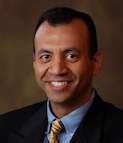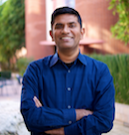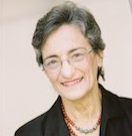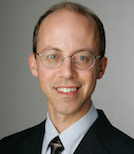Who killed the human-driven car?
With new federal and state regulations looming, and companies like Waymo and General Motors testing automated vehicles on the streets of Phoenix and San Francisco, driverless cars could be on roads across California by the middle of next year. USC experts discuss the long road to taking our hands off the steering wheel, and what the long-term and short-term implications might be for handing our car keys over to automation and artificial intelligence.
Contact: Ian Chaffee, (213) 810-8554 or ichaffee@usc.edu
A virtual driver’s value judgments
 “Some people argue that given the number of deaths in automobile accidents every year in the U.S. (approximately 36,000), it behooves us to implement collision avoidance algorithms immediately. But there are some unintended ethical and legal consequences that need to be considered.
“Some people argue that given the number of deaths in automobile accidents every year in the U.S. (approximately 36,000), it behooves us to implement collision avoidance algorithms immediately. But there are some unintended ethical and legal consequences that need to be considered.
“When a machine is programmed to operate in a certain way, it is premeditated. The programmer knows exactly how the machine will act in a given situation and the types of trade-offs it will make. Who will be deciding these trade-offs?
“These types of algorithms will also rely on the amount of information your car knows about you when you or your party are in it. So how much information should be fed into the algorithm? And how much information should your car know about you?
“The actions it makes will depend on this knowledge. And what if a person misrepresents this information to the vehicle to create more protection for their party? Will they be held accountable in the event of an accident?”
Ali Abbas can discuss the ethics of artificial intelligence in guiding the future of driverless cars and other autonomous vehicles. He is director of the USC Neely Center for Ethical Leadership and Decision Making, and a professor of industrial and systems engineering and public policy at the USC Viterbi School of Engineering and the USC Price School of Public Policy.
Contact: aliabbas@usc.edu
Could your self-driving car be hacked?
 “We’ve seen the steering and braking of individual vehicles taken over on the news. These pale in comparison to the impact of ‘software subversion’ in these vehicles. Familiar examples of software subversion include the recent ransomware attacks that have affected health providers, transportation systems and many other businesses.
“We’ve seen the steering and braking of individual vehicles taken over on the news. These pale in comparison to the impact of ‘software subversion’ in these vehicles. Familiar examples of software subversion include the recent ransomware attacks that have affected health providers, transportation systems and many other businesses.
“The software update process that will be inevitably provided for vehicles will make them vulnerable. What is needed is for the developers of these system to provide much more attention to their software architecture to ensure that basic safety constraints are embedded deep in the system and cannot be subverted.”
Clifford Neuman is director of the USC Center for Computer Systems Security at the USC Viterbi School of Engineering. He can discuss embedded software in self-driving cars and the ways in which it can be compromised.
Contact: (310) 448-8736 or bcn@isi.edu
Driverless cars changing city infrastructure
 “Much of the traffic infrastructure we have in cities today, such as traffic lights, static visual signs indicating driving rules and speed limits, etc., were designed for human drivers.
“Much of the traffic infrastructure we have in cities today, such as traffic lights, static visual signs indicating driving rules and speed limits, etc., were designed for human drivers.
“City, state and federal transportation departments will need to invest soon in deploying new infrastructure based on wireless communications for more efficient interaction with autonomous cars.
“With adoption of autonomous vehicles, we are also likely to see reduced ownership of vehicles, and a greater move toward renting and sharing. Increased use of carpooling could be a boon by reducing traffic congestion and energy usage for vehicles further.”
Bhaskar Krishnamachari can discuss how the advancement of wireless communication will impact the driverless car industry and what these developments also mean for the continued evolution of “smart cities.” His research focuses on a new paradigm of vehicle-to-vehicle communications in which information is exchanged between cars. Krishnamachari is the director of the Center for Cyber-Physical Systems and the Internet of Things (CCI), and an associate professor of electrical engineering at the USC Viterbi School of Engineering.
Contact: (213) 821-2528 or bkrishna@usc.edu
Autonomous cars already outpace legislation
 “Legislation is aptly being developed while the technology is still in its infancy. Although there are some regulations, the auto manufacturers are really going to determine the future of the technology rather than the lawmakers, which is an interesting twist from previous technological advancements.”
“Legislation is aptly being developed while the technology is still in its infancy. Although there are some regulations, the auto manufacturers are really going to determine the future of the technology rather than the lawmakers, which is an interesting twist from previous technological advancements.”
Jeffrey Miller can discuss autonomous vehicles, intelligent transportation systems and the ethics of driverless cars. He is an associate professor of engineering education at the USC Viterbi School of Engineering.
Contact: 213-740-7129 or jeffrey.miller@usc.edu
‘Virtual dashboard’ will improve passenger safety
 “New forms of visual displays, combined with aural and haptic feedback, will be designed to improve driver and rider situational awareness and increase safety; combining these with other active systems based on computer vision, such as lane departure and auto-braking, presents the promise of lower accidents, fatality rates, and more.”
“New forms of visual displays, combined with aural and haptic feedback, will be designed to improve driver and rider situational awareness and increase safety; combining these with other active systems based on computer vision, such as lane departure and auto-braking, presents the promise of lower accidents, fatality rates, and more.”
Todd Richmond can discuss how augmented reality and virtual reality technologies will be integrated into driverless car technologies and will help speed the development of those technologies. He is the director of the Mixed Reality Lab at the USC Institute for Creative Technologies and an assistant research professor of media arts and practice at the USC School of Cinematic Arts.
Contact: (310) 574-1620 or toddr@usc.edu
Reconciling federal and state regulations
 Genevieve Giuliano is available to discuss how changes in policy at the federal and state levels will impact transportation regulations, and how discrepancies in these regulations might be reconciled. She is a professor of public policy at the USC Sol Price School of Public Policy and the director of the METRANS Transportation Center, a collaborative research effort between the USC Price School, the USC Viterbi School of Engineering and California State University-Long Beach dedicated to solving transportation problems of large metropolitan regions through interdisciplinary research, education and outreach.
Genevieve Giuliano is available to discuss how changes in policy at the federal and state levels will impact transportation regulations, and how discrepancies in these regulations might be reconciled. She is a professor of public policy at the USC Sol Price School of Public Policy and the director of the METRANS Transportation Center, a collaborative research effort between the USC Price School, the USC Viterbi School of Engineering and California State University-Long Beach dedicated to solving transportation problems of large metropolitan regions through interdisciplinary research, education and outreach.
Contact: (213) 740-3956 or giuliano@usc.edu
The tradeoff of convenience with unemployment
 Alec Levenson can discuss the impact of driverless cars on driving jobs and how automation is changing human resources, labor and business costs. He is a senior research scientist at the USC Marshall School of Business’ Center for Effective Organizations.
Alec Levenson can discuss the impact of driverless cars on driving jobs and how automation is changing human resources, labor and business costs. He is a senior research scientist at the USC Marshall School of Business’ Center for Effective Organizations.
Contact: (310) 991-7215 or levenson@marshall.usc.edu
Will California get on the driverless road faster than anybody else?
Jonathan Handel can discuss safety regulations and other laws related to driverless cars. He is a lecturer in law at the USC Gould School of Law and former computer scientist who has testified on the issue before the California DMV. For more details on his expertise and best ways to reach him, please go to http://www.jhandel.com/cars.
Contact: jh@jhandel.com



